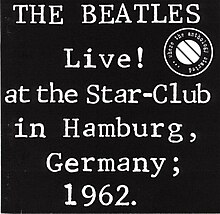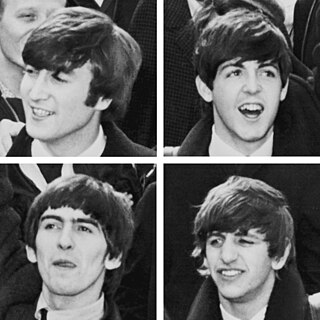
The Beatles were an English rock band formed in Liverpool in 1960, comprising John Lennon, Paul McCartney, George Harrison and Ringo Starr. They are regarded as the most influential band of all time and were integral to the development of 1960s counterculture and the recognition of popular music as an art form. Rooted in skiffle, beat, and 1950s rock 'n' roll, their sound incorporated elements of classical music and traditional pop in innovative ways. The band also explored music styles ranging from folk and Indian music to psychedelia and hard rock. As pioneers in recording, songwriting and artistic presentation, the Beatles revolutionised many aspects of the music industry and were often publicised as leaders of the era's youth and sociocultural movements.
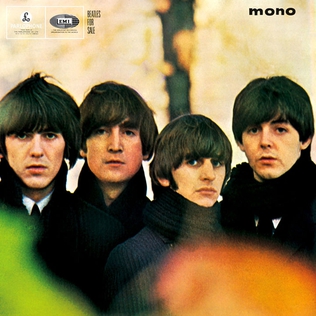
Beatles for Sale is the fourth studio album by the English rock band the Beatles. It was released on 4 December 1964 in the United Kingdom on EMI's Parlophone label. The album marked a departure from the upbeat tone that had characterised the Beatles' previous work, partly due to the band's exhaustion after a series of tours that had established them as a worldwide phenomenon in 1964. Beatles for Sale was not widely available in the US until 1987, when the Beatles' catalogue was standardised for release on CD. Instead, eight of the album's fourteen tracks appeared on Capitol Records' concurrent release, Beatles '65, issued in North America only.
The Beatles' bootleg recordings are recordings of performances by the Beatles that have attained some level of public circulation without being available as a legal release. The term most often refers to audio recordings, but also includes video performances. Starting with vinyl releases in the 1970s, through CD issues in the late 1980s, and continuing with digital downloads starting in the mid 1990s, the Beatles have been, and continue to be, among the most bootlegged artists.
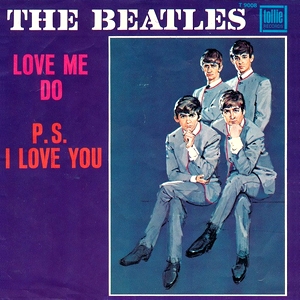
"Love Me Do" is the debut single by the English rock band the Beatles, backed by "P.S. I Love You". When the single was originally released in the United Kingdom on 5 October 1962, it peaked at number 17. It was released in the United States in 1964 and topped the nation's song chart. Re-released in 1982 as part of EMI's Beatles 20th anniversary, it re-entered the UK charts and peaked at number 4. "Love Me Do" also topped the charts in Australia and New Zealand.

My Bonnie is a 1962 album by English rock and roll singer-songwriter and musician Tony Sheridan. Sheridan, then playing in clubs in Hamburg with the Beatles, was discovered by producer Bert Kaempfert and subsequently signed with him to record for Polydor. Sheridan recorded several songs with the Beatles, of which only a single was released in 1961, the titular "My Bonnie" and B-side "The Saints", credited to Tony Sheridan and the Beat Brothers. While both songs are included here, the remaining tracks on this album were credited again to the Beat Brothers but recorded without the Beatles.
"Across the Universe" is a song by the English rock band the Beatles. It was written by John Lennon and credited to Lennon–McCartney. The song first appeared on the 1969 various artists' charity compilation album No One's Gonna Change Our World and later, in a different form, on their 1970 album Let It Be, the group's final released album. The original version featured on two different albums both titled Rarities: a 1978 British release and a 1980 US release. It was also included on their 1988 album Past Masters, Volume Two. The song has been covered by many artists, including David Bowie on his 1975 album Young Americans, which featured contributions from Lennon.

"Happiness Is a Warm Gun" is a song by the English rock band the Beatles from their 1968 album The Beatles. It was written by John Lennon and credited to the Lennon–McCartney partnership. The song was composed into three distinct sections, referred by Lennon as "the Dirty Old Man", "the Junkie" and "the Gunman ". He derived the title from an article in American Rifleman magazine and explained that the lyrics were a double entendre for guns and his sexual desire for Yoko Ono.

"Carnival of Light" is an unreleased avant-garde recording by the English rock band the Beatles. It was commissioned for the Million Volt Light and Sound Rave, an event held at the Roundhouse in London on 28 January and 4 February 1967. Recorded during a session for the song "Penny Lane", "Carnival of Light" is nearly 14 minutes long and contains distorted, echo-laden sounds of percussion, keyboards, guitar and vocals. Its creation was initiated by Paul McCartney's interest in the London avant-garde scene and through his connection with the design firm Binder, Edwards & Vaughan.

"Lovely Rita" is a song by the English rock band the Beatles from their 1967 album Sgt. Pepper's Lonely Hearts Club Band. It was written mainly by Paul McCartney and credited to Lennon–McCartney. It is about a meter maid and the narrator's affection for her.
"Mr. Moonlight" is a song written by Roy Lee Johnson and recorded by Dr. Feelgood and the Interns. The song was covered by the Beatles on their 1964 albums Beatles for Sale and Beatles '65.
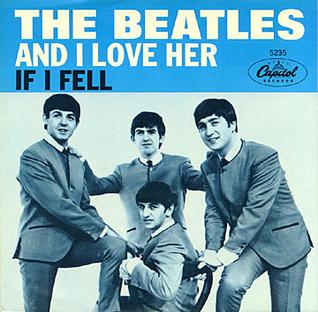
"And I Love Her" is a song recorded by English rock band the Beatles, written primarily by Paul McCartney and credited to the Lennon–McCartney partnership. It is the fifth track of their third UK album A Hard Day's Night and was released 20 July 1964, along with "If I Fell", as a single release by Capitol Records in the United States, reaching No. 12 on the Billboard Hot 100.
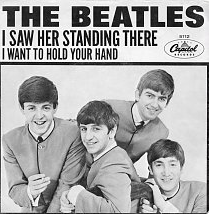
"I Saw Her Standing There" is a song by the English rock band the Beatles, written by Paul McCartney and John Lennon. It is the opening track on the band's 1963 debut UK album Please Please Me and their debut US album Introducing... The Beatles.

"Ask Me Why" is a song by the English rock band the Beatles originally released in the United Kingdom as the B-side of their single "Please Please Me". It was also included on their 1963 debut album Please Please Me. It was written primarily by John Lennon and credited to the Lennon–McCartney partnership.

"P.S. I Love You" is a song recorded by English rock band the Beatles in 1962. It was composed principally by Paul McCartney, and produced by Ron Richards. The song was released in the UK on 5 October 1962 as the B-side of their debut single "Love Me Do" and is also included on their debut album Please Please Me (1963). It was later included on the American release Introducing... The Beatles (1964), its reissue The Early Beatles (1965), and the Beatles compilation album Love Songs (1977).

"Magical Mystery Tour" is a song by the English rock band the Beatles and the title track to the December 1967 television film of the same name. It was released on the band's Magical Mystery Tour soundtrack record, which was a double EP in Britain and most markets but an album in America, where Capitol Records supplemented the new songs with tracks issued on the Beatles' 1967 singles. The song was written primarily by Paul McCartney and credited to the Lennon–McCartney partnership.
"If You've Got Trouble" is a song written by Lennon–McCartney and recorded by the Beatles on 18 February 1965 with Ringo Starr singing the lead vocal. The song was intended to be Starr's vocal appearance on the Help! album and the Help! film, but the Beatles were not happy with the recording and later chose to cover "Act Naturally" instead. "If You've Got Trouble" remained unreleased until Anthology 2 in 1996.
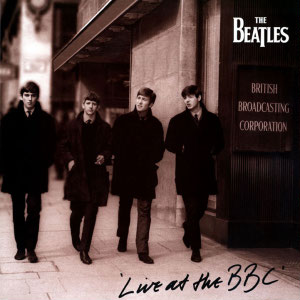
Live at the BBC is a 1994 compilation album featuring performances by the Beatles that were originally broadcast on various BBC Light Programme radio shows from 1963 to 1965. The mono album, available in multiple formats but most commonly as a two-CD set, consists of 56 songs and 13 tracks of dialogue; 30 of the songs had never been issued previously by the Beatles. It was the first official release by the Beatles of previously unreleased performances since The Beatles at the Hollywood Bowl in 1977 and the first containing previously unreleased songs since their final studio album, Let It Be, in 1970.
"Hello Little Girl" is one of the first songs written by John Lennon, credited to the Lennon–McCartney songwriting partnership. Written in 1957, it was used as one of the songs at the Beatles unsuccessful Decca audition in 1962, included on the 1995 compilation album Anthology 1. A 1960 home demo recording has never been officially released.
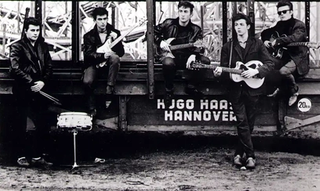
The original lineup of the Beatles, John Lennon, Paul McCartney, George Harrison, Stuart Sutcliffe and Pete Best regularly performed at different clubs in Hamburg, West Germany, during the period from August 1960 to December 1962; a chapter in the group's history which honed their performance skills, widened their reputation, and led to their first recording, which brought them to the attention of Brian Epstein.


